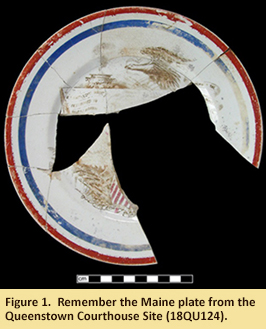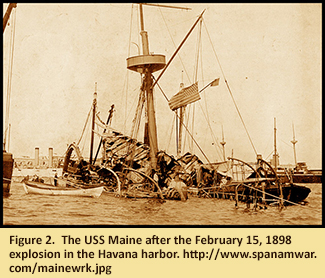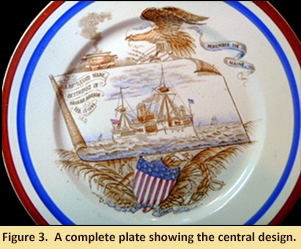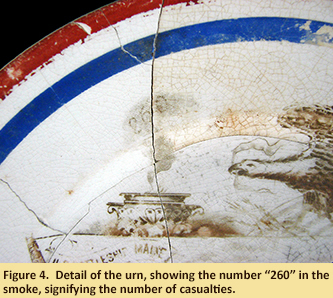Maryland Archaeological Conservation Laboratory
Main_Content
Curator's Choice 2015
Remembering the Maine
July 2015
By Patricia Samford, Director, MAC Lab
 With Memorial Day recently passed and Independence Day just ahead of us, a patriotically-themed Curator’s Choice somehow seemed appropriate for the month of July. This red, white and blue rimmed plate commemorates the sinking of the battleship USS Maine (Figure 1).
With Memorial Day recently passed and Independence Day just ahead of us, a patriotically-themed Curator’s Choice somehow seemed appropriate for the month of July. This red, white and blue rimmed plate commemorates the sinking of the battleship USS Maine (Figure 1).

Docked in the Havana harbor on what was billed as a friendly reconnaissance mission, the USS Maine was rocked by a massive explosion at 9:40 pm on February 15, 1898 (Figure 2). A U.S. Naval Court of Inquiry concluded that the ship had been destroyed by a Spanish mine and called for a declaration of war in April of that same year. A popular rallying cry became “Remember the Maine, to Hell with Spain!”
 The iconography on the plate, which was produced by the Edwin Bennett Pottery of Baltimore, is both commemorative and patriotic (Figure 3). The center of the plate contains a postcard style depiction of the ship with wording about its destruction in Cuba. An eagle clutches a banner proclaiming "Remember the Maine", and a stars and bars shield rests in an "amber field of grain" that masks a sword, anchor and ship spyglasses. Rising smoke from the funerary urn contains the number "260", a reference to how many men were killed in the explosion (Figure 4). There is disagreement on the number of casualties, ranging from 260 to 268, almost two-thirds of the ship's crew. At least one Maryland resident, ship machinist John A. Kay from Cecil County, was killed in the explosion (Cecil Daily.com).
The iconography on the plate, which was produced by the Edwin Bennett Pottery of Baltimore, is both commemorative and patriotic (Figure 3). The center of the plate contains a postcard style depiction of the ship with wording about its destruction in Cuba. An eagle clutches a banner proclaiming "Remember the Maine", and a stars and bars shield rests in an "amber field of grain" that masks a sword, anchor and ship spyglasses. Rising smoke from the funerary urn contains the number "260", a reference to how many men were killed in the explosion (Figure 4). There is disagreement on the number of casualties, ranging from 260 to 268, almost two-thirds of the ship's crew. At least one Maryland resident, ship machinist John A. Kay from Cecil County, was killed in the explosion (Cecil Daily.com).
This plate was recovered from the Queenstown Courthouse Site (18QU124), former location of Queen Anne County's eighteenth-century courthouse. At the time of the USS Maine explosion, the property served as private residence for the Harriett Embert family (Cheek et al 2011).
An armistice halted fighting in the Spanish American War in August of 1898 and a treaty was signed in December (History.com). While the explosion on the USS Maine catapulted the United States into war with Spain, there is strong evidence that the explosion was caused by an internal coal fire which ignited the ship’s magazines.
| References |
|
| Cecil Daily.com |
|
Remembering the Maine and John A. Kay. Website http://www.cecildaily.com/our_cecil/article_843b4af2-741a-5f4d-9cc3-bcc1c53ba5c6.html accessed June 19, 2015. |
|
| Cheek, Charles, Robert Hoffman, Lynn D. Jones and Cynthia Vollbrecht Goode |
| 2011 |
Queenstown Courthouse (18QU124) Artifact Collection MD456A from US 301 to MD18C. Queenstown, Queen Anne’s County, Maryland. Archeological Report No. 405. Maryland Department of Transportation. On file at the Maryland Archaeological Conservation Laboratory. |
|
| History.com |
|
February 15, 1898: The Maine Explodes. This Day in History. History.com website http://www.history.com/this-day-in-history/the-maine-explodes accessed June 19, 2015. |
|
| PBS.org |
|
February 16, 1898: Battleship U.S.S. Maine Explodes. Timeline on website http://www.pbs.org/crucible/tl10.html accessed June 19, 2015. |
|